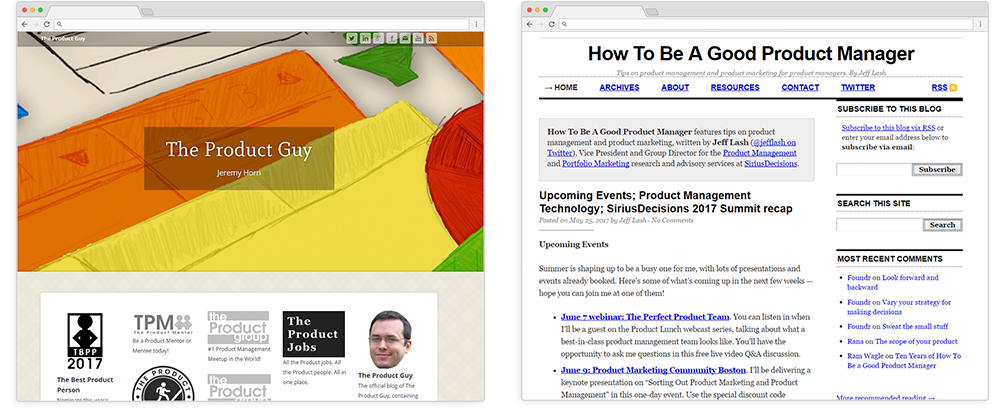The Community of Product Management
A tendency to dodge tangible conversation may spell trouble for the future of product.

Lately I've found myself pursuing something I've previously steered clear of: becoming engaged in the Product Community. Unfortunately, I'm quickly remembering why I've avoided it.
As a unit, it seems like the audible voices of product management rarely have much to say. Reddits, groups, and chat channels seem to be dominated by professionals hung up on the elementary details of product management. It's unclear if these samples accurate representation of product managers as whole, but it seems as though PMs who have already mastered the fundamental skills behind product have few places to turn for improvement.
These are some of the qualms I find myself hung up on:
Overused or Misused Lingo
It's easy to find images just like the one above; a quick google search for images representative of product management typically depict an individual dictating to a room, whether it be explaining simple topics to a massive lecture, or white-boarding in a professional setting. This raises a number of concerns:
- Implying complication. In the above example, it is well accepted that the concept of 'scrum' is complicated enough to justify a lecture. When paired with the existence of things like Scrum Master certifications, we lose the possibility that scrum is actually simple, and can be learned in a quick Google search, as most other things. This creates a perception that product skills are tangible, and that one can pay money to better those skills.
- Work Attitude. A fixation on textbook definitions of concepts or processes is simply an incorrect mindset to take when thinking about product management. If your idea of product management is limited to the process of working through issues, you may have lost sight of the bigger picture.
- False Expertise. Knowing the definition of terms does not make one a good product manager. They may get you past an interview, but this unapplied knowledge does not make one a good product manager.
Product Management is abstract, but our sources preach the opposite. A good product manager realizes that all projects are different, and that understanding terminology only arms one with guidelines. Processes should be shaped by the intended end product, not the other way around.
Disinterest in Technology
We tout the innovation of our products as though they are indistinguishable from magic; we are evangelists, yet how often do we analyze API responses or error codes to debug our own product's issues? As a PM, if you were asked to draw a technical diagram of the technologies which make up your products, would you be able to do so? As the leader of a team, one would hope so.
There is an abundance of preachers at the Church of Technology, yet most will neither show up on Sundays or even read the text. The expertise of Product Managers often goes unchecked, which is disastrous as these are the people defining companies.
Developers generally assume that their PM knows what they're talking about. Development is their passion, so they typically have no interest in the managerial processes. This creates a problem: why do skilled workers assume that people without such skills are more capable of leading projects than themselves?
I'm not saying non-technical PMs can't be good at their jobs, but it sure doesn't incentive them to learn. When respect is given rather than earned, there is little reason to improve your craft.
I would much prefer a guilty-until-proven-innocent mindset towards all product mangers.
PMs Create Mediocre Products

A product manager with a personal website or blog is a rare thing. Consensus in the community generally holds that these are excessive for product managers, as PMs are neither developers nor designers. This seems shortsighted, as product managers should in fact hold an understanding of both.
When PMs do delve into this space however, they often leave much to be desired. Above are a couple examples of product management sites and blogs: it's hard to believe that these represent a singularity of good UX and design. Product managers drive forth a vision for each of their products; if product managers cannot produce a usable product when given full control over their stack, they have demonstrated their own incompetence. Lack of technical skills is no excuse for propping up bad design. What sort of compromises would be made in a professional environment? Even more troubling, what if these individuals don't perceive these to be comprises at all?
Here is a directory of product management blogs which list plenty of similar examples.
Meetups & Conferences
Social events dominate the Product scene. Considering that product is the art of adaptation to specific circumstances, it begs the question of how many useful things could possibly be discussed during these gatherings. For the most part, they devolve into self-promotion and networking.
I suspect that many subconsciously perceive product as a personality-based profession. It makes sense that a product manager who considers themselves to be the 'face' of their team would place so much value on these gatherings, as they have an immeasurable allure that none can deny- at least in their own eyes. Yet, is this truly a worthwhile and valuable skill? CEOs and entrepreneurs may often take a similar stance, yet product managers presumably do not have the networks, funding, or experience to lead a company, otherwise they would not be product managers. How much value does a junior A-type personality bring to a company or a team?
I would love to see meetups and conferences focused on facilitating conversation around how to improve the field of product management as a whole. As it stands now, these gatherings mostly serve the purpose of networking and promotion, neither of which provide much value to anybody other than the individual themselves.
The Nature of Advice
Product Managers love to share what has worked for them, and must therefore be applicable to work for others. Once again we must remember:
Product Management is abstract.
Advice is useless without context. Being a "good product manager" at Google works because there's a culture of respect for the position. How well does this advice work for PMs at companies without this culture? Being humble and flying under the radar are great on paper, but these qualities don't translate well into every organization. Conversely they may result in invisibility, or lack of appreciation.
Instead of providing concrete solutions to problems, product management would likely be better served by teaching others how to think through problems. Answers themselves are meaningless, the method is what matters.
Do We Need a "Product Purge?"
A person who is good at most or all aspects of product is a Unicorn. Because we put so little value on accurately measuring the actual skills of Product Managers, these individuals will rarely be identified by anything other than their own success, which of course has all the variables of the organization they happen to be working for. It's troubling to consider that everyday heroes may be going unnoticed while self-proclaimed prophets giving SCRUM lectures bubble to the top as our profession's best.
It's worth considering a movement to ensure 'product guys' earn the title of "Product Manager." The idols of our field should be met with open skepticism as we dissect their words in search for substance. We must celebrate those who execute effective products that best serve their users. 'Good PMs' do themselves a disservice by being grouped in with those who simply sell the word 'product'. In order for this happen, there needs to be enough of us to build our own smaller community - one that would elevate 'those who do' over 'those who speak.'
As somebody who is directly impacted by the perception of our profession, don't allow yourself to stand by while snake oil salesmen belittle your ability to run teams and organizations.
